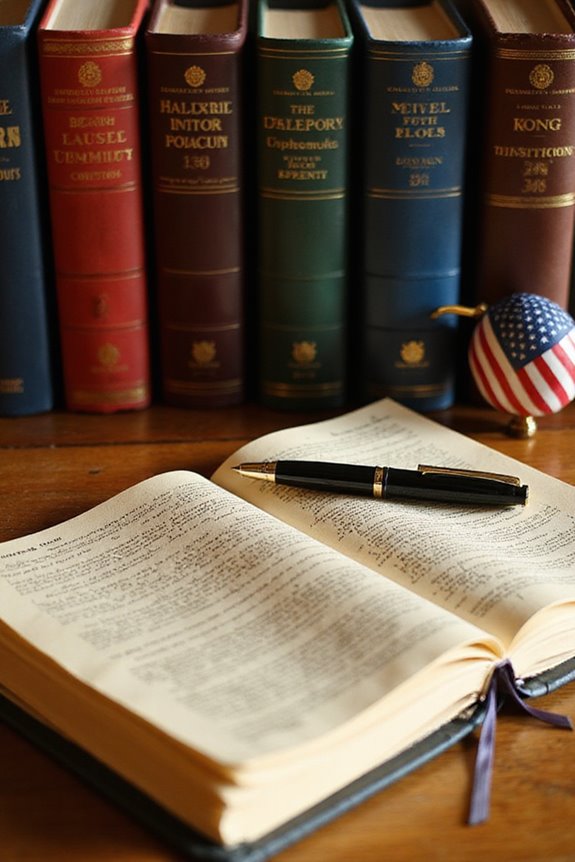For students seeking key political books, we recommend the following essential texts:
- Plato’s The Republic: Discusses justice and ideal governance.
- John Stuart Mill’s On Liberty: Explores individual freedom versus societal constraints.
- John Rawls’ A Theory of Justice: Introduces fairness and equality in justice.
- Alexis de Tocqueville’s Democracy in America: Analyzes democracy’s societal impact.
These foundational works foster critical understanding of political theories and ideologies, equipping students for deeper exploration of contemporary political analysis. More valuable insights await.
Key Takeaways
- Plato’s The Republic provides foundational concepts of justice and governance, essential for understanding political philosophy.
- John Stuart Mill’s On Liberty highlights the importance of individual rights and freedoms, crucial for liberal political thought.
- John Rawls’ A Theory of Justice introduces principles of fairness and equality, key for discussions on social justice and ethics in politics.
- Alexis de Tocqueville’s Democracy in America offers insights into American democracy and its societal implications, valuable for contemporary political analysis.
- Katherine J. Cramer’s The Politics of Resentment examines rural consciousness and its effects on modern political dynamics, relevant for understanding current political polarization.
Foundational Political Thought
Foundational political thought serves as the bedrock of our understanding of governance and political systems. This body of work encompasses various streams of political philosophy, beginning with Ancient Greek thinkers like Socrates, Plato, and Aristotle. Their contributions laid the groundwork for exploring concepts such as justice, governance, and civic virtue.
Key elements include:
- Republicanism: Emphasizes civic virtue and participation in the common good.
- Liberalism: Focuses on individual rights and the consent of the governed.
- Covenant Theology: Merges religious principles with political frameworks.
The evolution of these ideas reflects the complex interplay of history, law, and philosophy, shaping contemporary governance. Early American documents further illustrate the foundational principles of democracy, contributing to our political identity. This includes the influence of republicanism, liberalism, and covenant theology on American political thought, which showcases the richness and diversity of America’s civic culture. The discussions surrounding key political theories continue to inform our understanding of modern governance and its challenges.
Political Ideologies and Economic Theories

Political ideologies and economic theories shape the way societies organize their governments and economies. Understanding these concepts is essential for students exploring political structures.
- Political Ideologies:
- Liberalism: Advocates for active government roles and social welfare.
- Conservatism: Favors limited intervention and tax cuts.
- Libertarianism: Emphasizes minimal government and voluntary trade.
- Social Democracy: Combines capitalism with welfare programs, often influenced by historical analysis of political systems.
- Economic Theories:
- Keynesian Economics: Supports government intervention to manage demand and often emphasizes the role of Fiscal policy in stabilizing economies.
- Supply-Side Economics: Focuses on growth through tax cuts and deregulation. Modern economies often blend these ideologies and theories, resulting in mixed systems that cater to specific societal needs, like the U.S. regulated capitalist system and the Nordic model.
Political Activism and Reform

While activism can take many forms, understanding its historical context and strategies is essential for effective political engagement.
Key resources on political activism and reform include:
- *Dream: Re-imagining Progressive Politics in an Age of Fantasy* discusses innovative activism strategies.
- *Engagement Organizing* emphasizes mobilization techniques for grassroots organizers and NGOs.
- *How To Resist: Turn Protest to Power* presents principles for fostering empowerment through effective activism.
- *How to Win Campaigns: Communications for Change* focuses on strategic messaging vital for campaign success.
- *Resistance 101* introduces students to successful U.S. activist strategies, including insights on historical trends that have shaped modern movements.
Through these texts, we learn how reform movements are fueled by understanding historical contexts and utilizing effective activism strategies. Engaging with these works equips us to contribute meaningfully to ongoing political dialogues, particularly in the realm of social justice literature.
Contemporary Political Analysis and Insights

What can we learn from examining contemporary political analysis and insights?
- Political polarization has intensified, impacting party dynamics and voter alignment.
- John H. Aldrich’s Why Parties? illustrates parties evolving into quasi-parliamentary entities, vital for citizen representation.
- Katherine J. Cramer’s The Politics of Resentment explores rural consciousness, revealing how perceived marginalization fuels political resentment.
- This rural perspective, distinct from traditional economic interests, contributes to broader political shifts and populism.
- Understanding these dynamics is essential for analyzing modern electoral politics.
- By recognizing the interplay between political polarization and rural consciousness, we gain insights into the motivations driving contemporary political movements.
- These analyses emphasize the need for strategic engagement in addressing America’s democratic challenges and fostering inclusive political discourse.
- Additionally, the current political landscape is influenced by race and politics, as demonstrated in Michael Tesler’s work, highlighting how racial dynamics shape voter behavior and party alignment.
- The complexities of political theory also play a crucial role in understanding these phenomena, as they provide foundational frameworks for interpreting the motivations behind voter behavior.
Classics Shaping Political Science Curricula

Classics in political science play a vital role in shaping our understanding of the field. These foundational texts provide classical influences that inform curriculum evolution across universities.
Key classics include:
- Plato’s The Republic: Establishes principles of justice and societal structure.
- John Stuart Mill’s On Liberty: Emphasizes individual freedom against societal constraints.
- John Rawls’ A Theory of Justice: Introduces fairness in justice and equality.
- Hans Morgenthau’s Politics Among Nations: Defines realism in international relations.
- Alexis de Tocqueville’s Democracy in America: Analyzes democracy’s impact on society and its historical context that remains relevant today.
These works are essential in developing critical thinking, grounding students in historical context, and encouraging interdisciplinary connections that enrich political science education. Additionally, they provide foundational knowledge that remains relevant and impactful in understanding contemporary political issues.
Frequently Asked Questions
What Are the Best Political Books for Beginners?
As we plunge into the sea of political ideologies, we discover foundational texts like *The Republic* and *Justice* that illuminate essential concepts. These books are our compass, guiding beginners through the intricate world of politics.
How Do I Choose a Political Book to Read?
When choosing a political book, we should consider our reading strategies and thematic relevance. Focusing on our interests and current events guarantees we engage with material that’s both timely and meaningful to our understanding.
Are There Fictional Books That Explore Political Themes?
Absolutely, we’ve seen how dystopian societies mirror our realities, revealing truths through powerful political allegory. Books like *1984* and *Animal Farm* resonate deeply, urging us to reflect on authority, freedom, and the human condition.
What Recent Political Books Are Best-Sellers?
We’ve noticed that recent political best-sellers reflect current trends and political movements. Books like *Fear* and *Autocracy, Inc.* engage readers deeply, showcasing the evolving landscape of political discourse and the ongoing relevance of these themes.
How Can I Critically Analyze Political Literature?
When we immerse ourselves in political literature, we can channel our inner Sherlock Holmes. By employing literary techniques and engaging in thematic exploration, we uncover hidden arguments, biases, and power dynamics that shape our understanding of the text.






